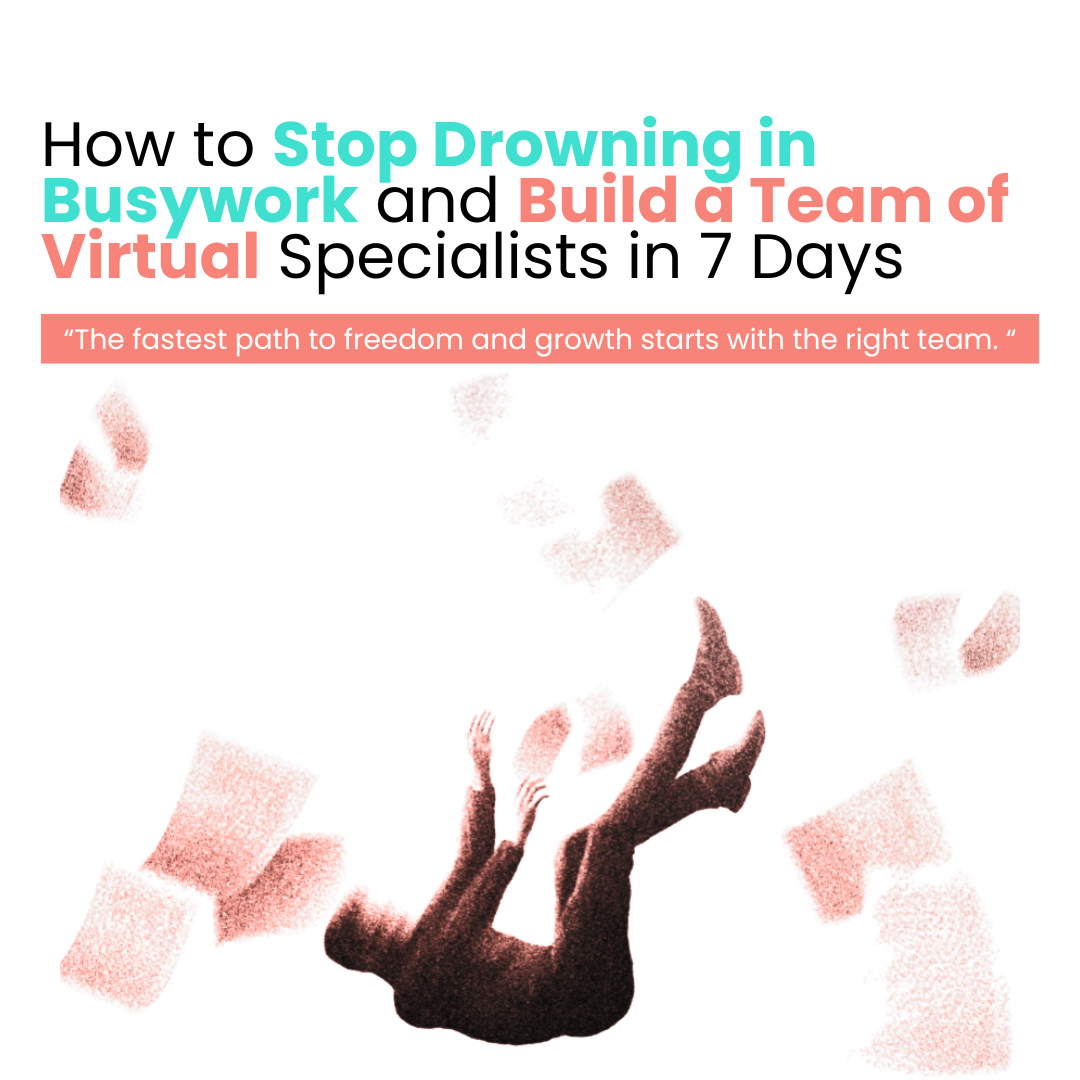How To Avoid Getting Overwhelmed As A Business Owner
The life of a business owner is often romanticized as an exciting journey filled with boundless opportunities and innovative breakthroughs. However, behind the scenes lies a reality that many outsiders fail to fully comprehend—the weighty and often overwhelming workload that comes hand-in-hand with steering the ship of a successful enterprise.
Business owners, whether they're pioneering startups or managing established companies, grapple with a myriad of responsibilities that extend far beyond the confines of a traditional 9-to-5 job. From strategic planning and financial management to employee supervision and customer relations, their roles are as multifaceted as they are demanding. The desire to build a thriving business can inadvertently lead these driven individuals to navigate through treacherous waters of stress and burnout.
In this blog post, we'll delve into the intricate challenges that contribute to the overwhelming burden felt by business owners. We'll shed light on the factors that often tip the scales toward exhaustion. More importantly, we'll uncover valuable insights and practical strategies on how to avoid becoming an overwhelmed business owner.
Related Article: 50 Tasks You Could Be Outsourcing to a Virtual Assistant
ARE YOU STILL TRYING TO DO IT ALL?
Discover the SMART way to delegate without losing control—and finally free up your time.
What Does Being Overwhelmed Mean as a Business Owner?
The term "overwhelmed" paints a vivid picture of being swamped, inundated, and utterly consumed—whether in thought or emotion. As an overwhelmed business owner, this state of being overwhelmed embodies a sense of being weighed down, filled to capacity, or inundated by an excessive influx of demands. It's a sensation that leaves business owners feeling as if they are trapped in an unending cycle of tasks, with time slipping through their fingers like grains of sand.
An overwhelmed business owner finds themselves caught in a relentless whirlwind of responsibilities, often grappling with a dual challenge. There's the pressing weight of an ever-growing to-do list, a constant reminder that there's simply too much to accomplish. Moreover, there's also the acute awareness that time is a finite resource, slipping away quicker than desired. This confluence of pressures creates a breeding ground for anxiety and stress, causing the mind to spiral into a state of paralysis—a feeling that the weight of it all is too much to bear, rendering even the simplest of actions seemingly insurmountable.
Related Article: Marketing Approaches for The Different Stages of A Business Lifecycle
Examples of an Overwhelmed Business Owner
Here are three situational examples of an overwhelmed business owner:
1. High Season Rush
Imagine a small bakery owner during the holiday season. They are inundated with a sudden surge in orders for special cakes, cookies, and pastries. They have to manage the increased demand for products, ensure timely deliveries, hire and train temporary staff, oversee quality control, and handle customer inquiries. Juggling all these tasks while maintaining the usual daily operations can leave the business owner feeling overwhelmed and stretched thin.
2. Unexpected Challenges
Consider a technology startup founder who has just launched a new app. Shortly after the launch, they discover a critical bug that is causing the app to crash for a significant portion of users. They need to urgently address the issue, communicate with users about the problem, work with their development team to fix the bug and manage the reputation damage caused by negative reviews and feedback. Simultaneously, they still need to handle regular business tasks like marketing, investor relations, and strategic planning, leading to a sense of overwhelm.
3. Expansion Struggles
Visualize a retail store owner who has decided to open a second location. They need to find a suitable space, negotiate leases, hire and train additional staff, manage inventory for both locations, coordinate marketing efforts, and ensure consistent customer experiences across both stores. The challenges of scaling up the business while maintaining the quality and standards of the original store can make the owner feel overwhelmed as they strive to balance various demands.
In each of these examples, the overwhelmed business owner is facing a combination of increased demands, unexpected obstacles, and the pressure to manage multiple aspects of their business simultaneously. This can lead to stress, time constraints, and a feeling of being stretched too thin.
7 Ways to Avoid Being Overwhelmed in Business
Here are seven ways to avoid being overwhelmed in your business:
1. Prioritize Tasks
Identify the most important and high-impact tasks that directly contribute to your business goals. Create a daily or weekly to-do list with these tasks at the top and tackle them first. This ensures that you're focusing on what truly matters and making progress on key objectives.
2. Delegate and Outsource
Recognize that you can't do everything yourself. Delegate tasks to capable team members or consider outsourcing tasks that are outside your expertise. This frees up your time to focus on strategic decision-making and high-level tasks.
3. Time Management
Implement effective time management techniques, such as the Pomodoro Technique or time blocking. Set specific periods for focused work and regular breaks. This can help you maintain productivity without feeling overwhelmed.
Related Article: 9 Productivity Tips for Busy Entrepreneurs
4. Set Boundaries
Establish clear boundaries between work and personal life. Avoid checking emails or working during designated personal time. Creating a work-life balance helps prevent burnout and ensures you have time for relaxation and rejuvenation.
5. Embrace Technology
Utilize productivity tools, project management software, and automation tools to streamline processes and reduce manual workload. These tools can help you manage tasks, track progress, and stay organized.
6. Learn to Say No
Don't overcommit yourself. Politely decline tasks, projects, or opportunities that don't align with your priorities or may spread you too thin. Focus on your core objectives and avoid taking on more than you can handle.
7. Regular Review and Reflection
Set aside time periodically to review your business goals, strategies, and operations. Reflect on what's working well and what needs improvement. This proactive approach can help you identify potential sources of overwhelm and make adjustments before they become problematic.
Remember that avoiding overwhelm is an ongoing process that requires self-awareness, effective planning, and the willingness to adapt and make changes as needed. By implementing these strategies, you can better manage your business responsibilities and maintain a healthier work-life balance.
Conclusion
Smart Virtual Assistant
👍🤵
Smart Virtual Assistant 👍🤵
In the fast-paced world of entrepreneurship, the journey of a business owner is often an exhilarating rollercoaster ride. Yet, amidst the highs and lows, one challenge remains consistent: the potential for overwhelming stress and burnout.
Thus, in this blog, we discovered that prioritization is key—how it is important to focus on core tasks that directly impact your business's growth and success. It is also emphasized to embrace the power of delegation, a concept that has been a game-changer for countless entrepreneurs. Through delegation, you are entrusting a load of your routine and time-consuming tasks to capable hands. This then frees up your mental space and gives you more energy for innovation and strategic thinking.
This is where SMART Virtual Assistants step onto the stage. With our expertise and versatility, our SMART VAs are your ultimate allies in the battle against overwhelm. We can seamlessly integrate into your operations, handling everything from administrative duties to customer support and digital marketing.
By partnering with us, you ensure that your business runs like a well-oiled machine while you maintain a healthy work-life balance.
FROM OVERWHELMED TO CEO IN 7 DAYS
Your shortcut to building a team of specialists who keep your business moving without you doing it all.
Frequently Asked Questions
-
Being a business owner can be both rewarding and stressful, and the level of stress can vary widely based on factors such as the nature of the business, the industry, the size of the business, the individual's personality, and their ability to manage challenges.
However, it's important to note that being a business owner isn't uniformly stressful. Many business owners find fulfillment, pride, and satisfaction in building and running their businesses.
They may also develop effective coping mechanisms and strategies to manage stress. Seeking support through networking, mentorship, and business associations can also help alleviate stress by providing guidance and a sense of community.
To put it simply, the level of stress experienced by a business owner can vary widely, and while challenges exist, they can often be balanced by the rewards and sense of achievement that come with entrepreneurship.
-
Being a business owner comes with various challenges, and different individuals may find different aspects particularly challenging based on their strengths, weaknesses, industry, and circumstances.
Here are three specific aspects that make being a business owner challenging:
Financial Uncertainty
Business owners often face financial uncertainty due to factors such as fluctuating revenue, unexpected expenses, and economic downturns. Managing cash flow, securing funding, and ensuring the financial stability of the business can be a constant source of stress and pressure.Decision-Making Under Pressure
Business owners are regularly required to make critical decisions that can have far-reaching consequences for the company. These decisions must often be made quickly and under pressure, with limited information or conflicting factors to consider. The weight of these choices can be mentally and emotionally taxing.Wearing Multiple Hats
In the early stages of a business or when resources are limited, owners are often required to take on multiple roles simultaneously. This might include tasks like marketing, sales, operations, customer service, and more. Juggling these responsibilities can be overwhelming and can lead to burnout if not managed effectively. -
Business owners often stay motivated by reconnecting with their “why”—the purpose behind starting their business. Setting small, achievable goals also helps maintain momentum when larger tasks feel daunting. Many also rely on support systems such as mentors, business communities, or accountability groups. Celebrating small wins, even minor progress, can be a powerful way to stay encouraged during stressful periods.
-
Preventing burnout involves proactively managing workload and setting boundaries. Business owners can avoid burnout by scheduling regular breaks, taking days off, delegating tasks, and incorporating healthy habits like exercise and mindfulness. Creating a manageable routine, limiting overtime, and seeking professional or peer support also contribute to long-term well-being and resilience.
-
A business owner should consider hiring help when workload consistently exceeds their capacity, important tasks get delayed, or quality begins to drop. Outsourcing becomes valuable when tasks fall outside the owner’s expertise or drain too much time. Bringing in support allows owners to focus on core activities like strategy, growth, and leadership—ultimately preventing overwhelm and improving business performance.
Ready to Work Smarter, Not Harder?
Smart VAs provides a team of highly skilled specialists from around the world, ensuring seamless support no matter the time zone. We take pride in delivering efficient, fast, and high-quality service so you can focus on growing your business. With one subscription plan, you gain access to a complete team of digital marketing experts that’s customized to your unique needs, eliminating the need to train and look for one yourself!






